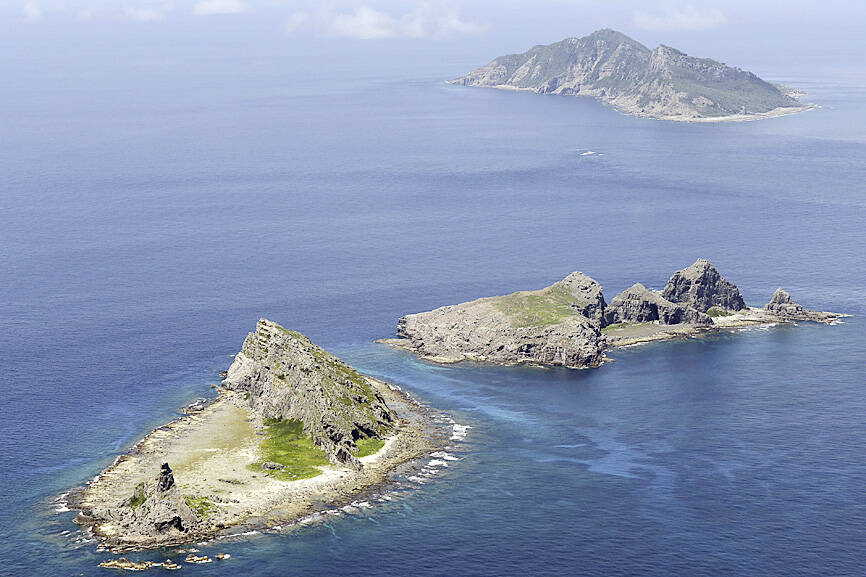China Coast Guard vessels have been passing by Japanese-claimed waters for weeks in the East China Sea and China’s warships have been edging near Japan’s southwestern islands over the past few days, Japanese officials said.
A fleet of four China Coast Guard vessels on Thursday passed just outside of the territorial waters of Japan-controlled islands, which Beijing and Taiwan also claim, for the 49th day in a row, the Japan Coast Guard said.
It said it warned China’s vessels against further approaching the Diaoyutai Islands (釣魚台群島) — known as the Senkakus in Japan.

Photo: AP
The China Coast Guard on Tuesday acknowledged that it was patrolling waters off the Diaoyutais.
China routinely sends coast guard vessels and planes into waters and airspace surrounding the islands to harass Japanese vessels in the area and force Japan to scramble jets in response.
Japan Coast Guard Commandant Shohei Ishii last month said that Chinese activity in infiltrating Japanese territorial waters is in breach of international law, and that the “situation is extremely serious and is unpredictable.”
Tokyo in recent years has significantly reinforced defense of southwestern Japan, including Okinawa and its outer islands that are considered strategically key to Japanese defense in the face of China’s growing assertiveness and tension around Taiwan.
The Japanese Ministry of Defense this week said that it had repeatedly spotted Chinese warships off the coast of Okinawa since last week.
On Thursday last week, a Chinese guided missile destroyer and frigate crossed the waters between Okinawa and the Miyako islands as they moved south, prompting Japan to deploy a warship and a reconnaissance aircraft.
On Saturday, a reconnaissance ship passed the area to the north. Then, on Sunday, the Chinese reconnaissance ship showed up in the waters again, the ministry said.
On Monday, the guided missile destroyer and the frigate were spotted crossing the waters between Okinawa and Miyako, the ministry said.

AGING: As of last month, people aged 65 or older accounted for 20.06 percent of the total population and the number of couples who got married fell by 18,685 from 2024 Taiwan has surpassed South Korea as the country least willing to have children, with an annual crude birthrate of 4.62 per 1,000 people, Ministry of the Interior data showed yesterday. The nation was previously ranked the second-lowest country in terms of total fertility rate, or the average number of children a woman has in her lifetime. However, South Korea’s fertility rate began to recover from 2023, with total fertility rate rising from 0.72 and estimated to reach 0.82 to 0.85 by last year, and the crude birthrate projected at 6.7 per 1,000 people. Japan’s crude birthrate was projected to fall below six,

Conflict with Taiwan could leave China with “massive economic disruption, catastrophic military losses, significant social unrest, and devastating sanctions,” a US think tank said in a report released on Monday. The German Marshall Fund released a report titled If China Attacks Taiwan: The Consequences for China of “Minor Conflict” and “Major War” Scenarios. The report details the “massive” economic, military, social and international costs to China in the event of a minor conflict or major war with Taiwan, estimating that the Chinese People’s Liberation Army (PLA) could sustain losses of more than half of its active-duty ground forces, including 100,000 troops. Understanding Chinese

US President Donald Trump in an interview with the New York Times published on Thursday said that “it’s up to” Chinese President Xi Jinping (習近平) what China does on Taiwan, but that he would be “very unhappy” with a change in the “status quo.” “He [Xi] considers it to be a part of China, and that’s up to him what he’s going to be doing, but I’ve expressed to him that I would be very unhappy if he did that, and I don’t think he’ll do that. I hope he doesn’t do that,” Trump said. Trump made the comments in the context

SELF-DEFENSE: Tokyo has accelerated its spending goal and its defense minister said the nation needs to discuss whether it should develop nuclear-powered submarines China is ramping up objections to what it sees as Japan’s desire to acquire nuclear weapons, despite Tokyo’s longstanding renunciation of such arms, deepening another fissure in the two neighbors’ increasingly tense ties. In what appears to be a concerted effort, China’s foreign and defense ministries issued statements on Thursday condemning alleged remilitarism efforts by Tokyo. The remarks came as two of the country’s top think tanks jointly issued a 29-page report framing actions by “right-wing forces” in Japan as posing a “serious threat” to world peace. While that report did not define “right-wing forces,” the Chinese Ministry of Foreign Affairs was